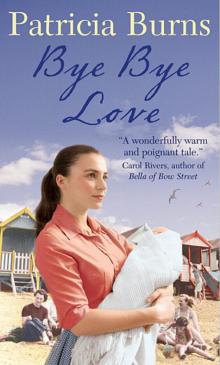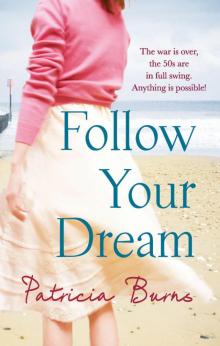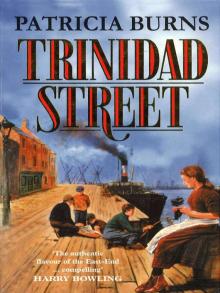- Home
- Patricia Burns
Packards Page 5
Packards Read online
Page 5
‘I have played clock golf,’ Isobel told her.
‘Not quite the same thing, but it’s a start, and heaps better than anyone else I’ve interviewed. It’s so important you see, that I should have somebody who really knows what she is talking about when she serves the customers. I want to build a reputation for excellent advice as well as first-class merchandise. Now tell me, if I were to come to you and ask to see tennis outfits, how would you advise me?’
Isobel thought. ‘Well – I would recommend a dress rather than a skirt and blouse, as a blouse does tend to ride up when one takes a swing at the ball –’
Miss Packard nodded encouragingly.
‘– with a hemline on the short side, to allow for easy running around, and not too tight, so that you can reach for the ball and breathe easily.’
‘Bravo! You have it exactly.’
For the first time in weeks, Isobel found herself smiling naturally. Hope stirred painfully once more inside her. She very much wanted, not just any position, but one with this vital and friendly girl. On impulse, she decided to forestall the inevitable questions about her past experience.
‘I’ve never worked in a shop before,’ she admitted. ‘In fact, I’ve never worked anywhere. My parents both died very recently and I find myself in very reduced circumstances. I’m not really qualified to do anything, but I’m more than willing to learn and I’m quick with figures.’
Miss Packard was instantly sympathetic. ‘How dreadful for you. And now you’re quite on your own? That explains this then,’ she nodded at the form. ‘Well, I’m more than happy to offer you a position in my department. The only trouble is, I do have to ask you for a reference. Company policy, you see. Now, surely there is somebody who would vouch for you? Your vicar or minister perhaps?’
Isobel could have wept with frustration. At last, a job was within her reach, a job with a roof over her head and food to eat and money at the end of each week. But what was this nice girl going to say when she explained the next bit?
‘There – there is – I mean, the vicar would be very willing, I’m sure – it’s just – well – when I came to London, I wanted to make a new start where nobody knows me, so I changed my name.’
Miss Packard nodded. ‘Of course, yes, I can see it would be very embarrassing to have all your old friends knowing you were now serving in a department store. But surely you could depend upon your vicar to be discreet about it?’
Isobel almost laughed. The whole of Tillchester could talk about her working in a department store for all she cared. What mattered was that her brother-in-law should never ever find out where she was living.
‘I suppose so,’ she said.
‘Well then, that’s easily settled, isn’t it? If you could let me have some proof of your real name and address, then I can write for a testimonial and it can all be put away in your file and nobody but you and I will know anything about it.’
Isobel had to take a chance on it. It was that or lose the job, and she couldn’t bear that, not after getting so close. She reached into her pocket and took her very last visiting card out of its case. On the back she wrote her vicar’s name and address.
‘Splendid. I’m sure that together we shall build the most successful department in the store. This is very important to me, you know. We shall only be a small team and we have ourselves to prove, but we shall be successful, shall we not?
‘Now, terms and conditions. You will be given bed and board at one of our houses in Trent Street and dinner and tea here at the staff dining room. As you will be employed as a junior sales girl, your wages will be seven shillings and sixpence per week. Hours are from half-past eight till half-past six in the winter and seven in the summer, with a half-day on Saturday, when we close at two. After your first year, you are entitled to five days’ holiday a year. You must wear a plain black skirt and white blouse to work in, and I am having a badge designed for the people in my department, with a tennis racquet and “Ladies’ Sportswear” on it. Now, is that all clear?’
Her head spinning, Isobel nodded. She would have agreed to almost anything if it meant work and safety.
‘Good. Well, I shall have to send for this reference, but I’m sure that will be all right, so I take it you are free to start work on Monday week?’
‘Y – Yes.’
‘Then you should report to Trent Street on Sunday afternoon. I’ll make sure somebody knows you will be coming. Good afternoon, Miss Brand.’
It was over. Miss Packard was standing up and holding out her hand. Isobel stood as well, shook hands, stammered her thanks and tottered out. She stood for fully half a minute in the waiting room without seeing or hearing anything. Then suddenly her legs gave way and she collapsed into the nearest chair. Tears slid down her face.
There was an arm round her shoulders, and a voice somewhere near.
‘Never mind, ducks. Plenty of other places, eh?’
Isobel shook her head, tried to speak through the tears.
‘I got it. I got a place. Oh it’s so wonderful. I can’t believe it. Now I shall be safe.’
5
‘I STILL DON’T see why you got to go and live in,’ Daisy’s mum complained. ‘What’s the matter with your own home? Ain’t it good enough for you?’
Daisy sighed. They had been through all this a hundred times before.
‘It ain’t that, Mum. I told you, it’s just that it’ll be nearer. Just five minutes’ walk away from the shop. If I stopped at home, it’d take me ages each day on the bus, and cost me a fortune and all.’
They were sitting in the tiny back room that served as kitchen, scullery, eating and living room of the Phippses’ house. It was early Sunday morning, so not everybody was up. Those who had been out drinking last night would probably not make an appearance till gone midday.
‘Cost you a fortune living in, more like. You won’t have hardly nothing left.’
That was the real core of the matter. Money. Of the twelve members of the Phipps family, only four were working. Daisy’s dad had injured his back in a dock accident five years ago. He was still able to do his bit towards creating more little Phippses, but it had finished his chances of permanent employment. The two eldest boys both had jobs, but one was about to get married and take his income to his future mother-in-law’s place. All six smaller children were still too young for full-time jobs, though they were expected to earn what they could out of school hours, which left Daisy, who had been slaving all hours at a small draper’s in Poplar, and her sister Nell, who worked in a local factory. Naturally, they gave their pay packets to their mother each week, and she doled out their pocket money. But it still did not leave much for Mrs Phipps to feed all those mouths, and now that Daisy was leaving home, there was going to be even less.
‘I’ll send you a postal order each week,’ Daisy promised.
Her mother sniffed. ‘I should hope so too, after I worked my fingers to the bone all these years bringing you up.’
‘Dot’ll be twelve in July. She’ll be able to work then,’ Daisy pointed out.
‘That’s as maybe, but what about Billy, and Ivy?’ Mrs Phipps demanded.
Daisy tried hard not to feel guilty. It wasn’t her fault that the strength in the family seemed to run out about halfway down the line of children. Not that any of the older ones were particularly fine specimens. Like Daisy, they were small and thin with pinched features and a colourless look to them. But at least they were tough and could stand the long hours and hard conditions they had to endure at work. The younger Phippses were poor things by comparison. They suffered from weak chests, or wasted limbs, or worst of all in two cases, were simple in the head. They were sitting at the table now, listening to the conversation with open mouths and vacant eyes. It was a terrible burden for Mrs Phipps to bear.
‘At least there’ll be more room with me out of the way,’ Daisy pointed out. ‘Two of the little ’uns can share my bit of the bed with Nell. You won’t have to pay Aunty Aggie to have them rou
nd at her place.’
‘There’s that, I suppose,’ her mother conceded.
But she was not convinced, and Daisy knew it. What was more, she knew that Nell, inspired by her own break for freedom, was considering leaving home as well. Not for the first time, she wavered. Good daughters stayed at home and helped their mums by bringing in a pay packet and lending a hand with all the many chores. If Daisy did what was expected of her, she would earn the approval of her parents and the respect of all the neighbours. And she would marry some boy from nearby and end up just like her mother. Daisy did not want that.
‘Don’t you want me to better myself, Mum?’ she asked. She might have saved her breath.
‘Better y’self! Who do you think you are, for Gawd’s sake? Running off to this fancy shop in the West End. They’ll see right through you, my girl. Lot of stuck-up snobs, that lot. All la-di-da and thinking they’re something special. You’ll be back with your tail between your legs, you mark my words.’
That was just what Daisy was most worried about. The other shopgirls had all seemed such superior creatures. She was afraid they would look down on her. But she was not going to let her mother know of her fears.
‘I’m just as good as what they are any day. Miss Packard herself give me a job, didn’t she? So I must be. And anyway, Mum, whatever you say, I’m going to give it a go.’
Mrs Phipps folded her arms across her skinny chest. ‘Well, don’t say as I didn’t warn you, my girl.’
Daisy picked up her carpetbag. It had seen better days, but she loved it, for ever since she had bought it from a second-hand stall it had been her symbol of escape. She, Daisy Phipps, was going to leave the Isle of Dogs with its filth and noise and drudgery and go to live in the magical world of Oxford Street. Now the moment had come, and it suddenly felt like a very big step indeed. She dropped the bag again and flung her arms round her mother.
‘I’ll miss you all, Mum, I really will!’
For a moment her mother was stiff and resistant. Then she gave way, and hugged her back.
‘You be a good girl, mind.’
‘I will, Mum, I promise.’
Nell appeared with a shawl round the shift she had slept in. She gave Daisy a hug and a kiss.
‘Keep smiling, Sis.’
‘Thanks, Nell. Look after y’self, and Mum and the kids.’
The younger ones flocked round her then. Daisy brushed them off as quickly as possible. They mostly had runny noses and dirty fingers, and she was wearing her best dress. Sniffs and wails started up.
‘Oh Gawd, that’s all I need. I’m not going to the blooming North Pole, you know,’ Daisy said, trying to turn it into a joke. ‘I’ll be back to see you before you know I’ve gone.’
She finally managed to get away from the clinging hands. She crept through the front room where her two older brothers were snoring on the Put-u-up, and stepped outside.
The street that had been home to her for all of her eighteen years was wrapped in its Sunday morning quiet. Only the Catholic families were up, getting ready for early Mass. A thin drizzle started, emphasising the drabness of the place, with its two rows of mean terraced houses facing each other across a narrow stretch of dirty cobbles. Later on in the day, it would come to life with children playing and women gossiping, but now it just looked dead and depressed. There was nothing here to keep Daisy from wanting to go. Nothing except a short lifetime of ties and memories. Here lived her friends, her school pals, her relatives, even a couple of past sweethearts. Tears pricked behind Daisy’s eyes. She blinked them back. She must not cry. She was off on her great adventure. Squaring her thin shoulders, she set off.
It was a slow journey through London, for though there were none of the weekday traffic jams, neither were there many buses. The East End was slowly coming to life as she left it, but the City was dead and the West End still asleep. The churches and chapels she passed on the way had people going in or out, but otherwise most of London seemed to be taking a well-earned rest.
Daisy stepped down from the new motor bus in Oxford Street and stood as it rumbled away. She looked across the road, and there it was – her Eldorado, Packards. It rose to a majestic five storeys, topped by its noble glass dome. Even in the gloom of a wet March morning, its windows gleamed. Daisy gazed at it. Tomorrow, she was going to be working there, in that fairytale palace filled with light and warmth and beautiful things. It was just too good to be true. She crossed the road and walked slowly all round the shop, looking in every window, veering between apprehension and wonder.
She had just come back to the front again when she was confronted by a whiskered policeman. He stared down at her with obvious disapproval.
‘Move along, miss.’
Daisy gaped at him. ‘What?’
‘I said, move along, miss. We don’t have your sort hanging about here. Not that you’re likely to get much custom at this time of day.’
Daisy was enraged. ‘Who do you think I am? Flaming cheek! Do I look like a prossie? Do I? I’m a respectable girl, I am. I’ll have you know I’m starting work right here at this shop tomorrow.’
The policeman had the grace to look chastened. ‘Just doing my duty, miss.’
‘Well you better look a bit harder at people before you go accusing them,’ Daisy told him.
She was just about to flounce off when it struck her that she had been a long time in getting here.
‘Here,’ she said, ‘if you’re so keen on duty, you can tell us the time.’
The man consulted his watch. ‘Two minutes past ten, miss.’
‘Blimey!’ Daisy squealed. She was supposed to have been at the staff hostel at ten o’clock.
‘Looking for Trent Street, miss?’ the policeman asked.
‘Yes,’ Daisy admitted.
‘First left, second right.’
Daisy set off at a trot, the carpetbag weighing heavily on her arm. As she turned the corner, she saw the policeman still looking at her. She waved.
‘Thanks, mate.’
She arrived at Trent Street red-faced and breathless, and looked down the road. She was once again in a street of terraced houses, but very different from the one she had left earlier that morning. The two rows of dwellings were three storeys high, plus dormered attics, and set over semi-basements. The brickwork was sooty, but the doors and railings were newly painted, the windows were clean and the steps scrubbed. Some of the area sills even sported windowboxes filled with crocuses and daffodils. The whole place had a well-cared-for look. Daisy was overwhelmed. To think that she was going to live somewhere like this. She walked up the street, looking at the numbers.
At number twenty-four, she stopped. This was it: her new home. Her heart thudded painfully in her chest and her mouth felt dry. Then from inside came the sound of laughter, and someone started singing ‘The Boy I Love is Up in the Gallery’. Daisy’s courage returned. She marched up the steps and banged the shiny brass knocker.
The door was opened by a girl a year or two older than herself with a mass of frizzy dark hair. There was a smell of polish overlaid by that of fried bacon. Daisy’s stomach growled.
‘Yes? Oh – you must be the other new girl. One’s come already. Is that all you’ve got?’ She nodded at Daisy’s bag.
Daisy responded instantly to the whiff of contempt. ‘’Course not. The rest’s following later. You going to let us in, then?’
The other girl shrugged and stood aside. She called into the depths of the house.
‘Mrs Drew! New girl’s come.’
There was the sound of heavy footsteps ascending, and a middle-aged woman dressed entirely in black appeared from the direction of the basement stairs. Her grey hair was scraped back into a tightly controlled bun and her mouth was set in a line. Her sharp eyes looked Daisy over.
‘You’ll be Miss Phipps?’
Daisy gulped. Nobody had ever called her that before. Her family and friends called her Daisy or Daise, or sometimes Daisy Belle after the song, and at the draper’s s
he was called Phipps. But never Miss Phipps.
‘I am Mrs Drew. I am the housekeeper for here and number twenty-six. I am responsible for the good conduct of these houses, so I trust you do know how to behave?’
Daisy drew breath to say something indignant, met the grey eyes and thought the better of it. One of the teachers at her old school had had a look just like that, able to quell a riot at a glance.
‘Er – yes,’ she said.
Mrs Drew nodded. ‘I hope so. Follow me and I’ll show you to your room.’
‘Oh – er – thanks,’ Daisy muttered.
They went up the first flight of stairs, the treads of which were covered with highly polished linoleum.
‘You are in room 1A in the attic, with the other new girl,’ the housekeeper said.
On the landing, a door opened and a face poked round, gave Daisy the once-over and popped back in again. An explosion of giggles came from inside the room. Mrs Drew gave a disapproving snort.
‘Foolish child.’
Up another flight, and then the stairs got narrower and steeper as they went up into the roof. In the dim light at the top, Daisy could just make out the metal numbers on the cream-painted doors. Mrs Drew knocked on 1A and went in without waiting for an answer.
‘Miss Brand, this is your roommate, Miss Phipps.’
She turned to Daisy. ‘The house rules are behind the door. Read them. You can fetch hot water from the kitchen if you need it. The lavatory is on the first floor. Dinner is at one o’clock sharp.’
With which she was gone.
Daisy was left standing in the middle of the room. It was painted a uniform cream colour and was spotlessly clean. The ceiling sloped on both sides, but it was still higher than any of the rooms in the Phipps house. A dormer window with green flowered curtains let in the spring light and the floor was covered with polished linoleum in a fawn and green fern pattern. There were two iron bedsteads with green coverlets, two rows of pegs, two plain deal chests of drawers and a washstand with a plain white basin and ewer. All this was remarkable enough, and normally would have left Daisy breathless, had it not been for the other inhabitant of the room. For she was quite simply the most lovely thing Daisy had ever seen.

 Packards
Packards Bye Bye Love
Bye Bye Love Follow Your Dream
Follow Your Dream Trinidad Street
Trinidad Street We'll Meet Again
We'll Meet Again